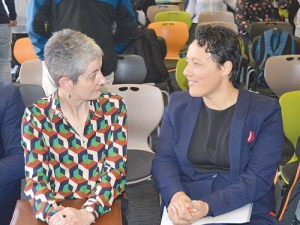Editorial: Time for a reset
OPINION: The Government's recent announcement that methane targets will be reviewed is bringing relief to farmers.
 Labour MP Kiritapu Allan (right) with new MPI deputy director general policy and trade Penny Nelson at the ETS forum.
Labour MP Kiritapu Allan (right) with new MPI deputy director general policy and trade Penny Nelson at the ETS forum.
The Government says it will be important to set the right 2050 target in its Zero Carbon Bill.
Labour MP and primary production committee member Kiritapu Allan says the Government recognises the target has to be “something that everybody can get behind, live with and work towards achieving together”.
Speaking at a New Zealand Institute of Agriculture and Horticultural Science (NIAHS) forum in Wellington this month, Allan said the Government is looking for “an enduring consensus on this target to provide the certainty the sectors have been asking for”.
“With this Act we aim to be clear, honest and fair to farmers about what will be expected of them in the future.
“Everybody has a role to play in meeting these future targets. We need to work with farmers and the sectors to share best practice and support farmers through this transition.”
By means of the Zero Carbon Act, the Government will also set up an independent climate change commission in 2019 to advise on climate change issues. An interim climate change committee has been set up as a precursor and this is providing analysis on how surrender obligations could best be arranged if agricultural methane and nitrous oxide emissions enter into the NZ emissions trading scheme (ETS).
Allan says the committee will give evidence and analysis of the full range of policy options to reduce emissions from the agriculture sector.
“This will include, but is not limited to, the pricing of agricultural emissions in the NZ ETS.
“In providing their analysis and recommendations, the committee will consider the Government’s objective for a just transition.”
‘Just’ land-use transition
Labour MP Kiritapu Allan says the Government sees reducing NZs agricultural greenhouse gas emissions as an important and necessary step towards a productive, sustainable and inclusive economy.
Achieving this will require a just transition to more sustainable land use, she says.
“Farmers are facing demands to lower their greenhouse gas emissions and improve water quality, biodiversity, biosecurity and animal welfare outcomes.”
To align these objectives, various approaches and tools, such as a One Farm Plan and Overseer, are being developed and improved. This has opportunities for farmers and producers.
“An intensive, volume-driven growth model has created economic and environmental sustainability concerns.
“Continuing to grow wealth this way is no longer viable. By focussing instead on proving our strong environmental credentials, we can add value to our products and ensure their premium status. By diversifying and adding value, we can also boost our resilience and lessen exposure to swings from commodity prices.”
Nine lucky school leavers passionate about farming will join Pamu for a two-year journey into agriculture, living and working at Pamu farm, Aratiatia near Taupo.
Nutritionists are urging Kiwis to kickstart their day with a piece of fresh fruit to help improve their health and wellbeing this autumn.
Under its innovation strategy, Craigmore Sustainables says it is collaborating with new innovators of technology across sustainability, people, animals and business management to enhance New Zealand's dairy sector.
Deeply cynical and completely illogical. That's how Kimberly Crewther, the executive director of DCANZ is describing the Canadian government's flagrant breach of international trade law in refusing to open its market to New Zealand dairy exports.
This week the winner of the prestigious Ahuwhenua Trophy for the top Māori Dairy farm will be announced at a gala dinner in Hamilton.
Once-a-day milking (OAD) can increase or lower the amounts of proteins in milk, according to a new study published in the journal Dairy.
OPINION: Scientists claim to have found a new way to make a substitute for cow's milk that could have a…
OPINION: The Irish have come up with a novel way to measure cow belching, which is said to account for…